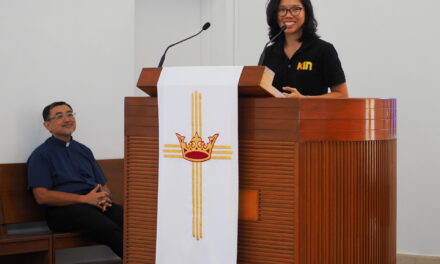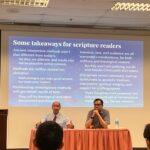
Class Attendance Matters
General Policy on Class Attendance
Guiding Principles
The policy is designed:
- To preclude discrimination between international students and local students;
- To promote mutual accountability;
- To be strict with the iniquitous but gentle with the infirm; and
- To recognise Christ as our one Teacher (Matt 23.10), while the lecturers are agents/facilitators.
Regulations
- Class attendance is compulsory.
- Students who need to apply for Leave of Absence (LOA) are to follow the proper application procedures.
- Students are to explain their absences directly to their course lecturers.
- Only cases for discipline are to be brought to the Academic Dean.
Infringements
- The college 3-step disciplinary process may be applied for recalcitrants: official
reprimand→suspension→expulsion. - Some practical advice:
- Lecturers are to talk to absentees or warn them, before the problem is brought before the Academic Dean.
- Students are to explain any intricate or intractable problems to their lecturers before the matter worsens.
Minimum Attendance
- In line with our philosophy of having face-to-face in-situ class learning, students should not be absent for more than three classes per course enrolled. Should students be absent for more than three classes for valid reasons, they need to seek permission from the Dean’s Office.
- Those who miss more than three classes with approved absences will be closely monitored and given extra help to keep pace with their studies when this becomes necessary. Paced assignments may be set.
Applying for Leave of Absence (LOA) and Leave of Disruption (LOD)
Leave of Absence
- As highlighted in the General Policy of Class Attendance, enrolling into a programme requires commitment. However, there may be legitimate circumstances under which students need to apply for a leave of absence (LOA).
- Procedures for LOA applications are as follows:
- In foreseeable situations, applications for LOA should reach the Academic Dean’s Office (ADO) through email ([email protected]) at least five working days before the intended start date of leave.
- Students who need to apply LOA due to unforeseeable or emergency situations can apply LOA retrospectively. Such LOA applications must be submitted to ADO through email no later than 5 working days after the last date of absence.
- All LOA applications must be cc’d to the lecturers concerned and attached with supporting documents.
- If church/organisation affair is stated as reason for the need to be absent from class, an official endorsement from the church/organisation is required as supportive document.
- Only LOA application cc’d to the lecturers concerned and attached with supporting documents will be processed and replied.
- Students on LOA may make own arrangements with fellow classmates to collect lecture notes and/or record lectures. Please note that students who plan to record lectures are to seek prior permission from the lecturers concerned.
Leave of Disruption
- A student is allowed to apply for Leave of Disruption (LOD) if a serious and unavoidable circumstance beyond the student’s control has caused, or is expected to cause, disruption to his or her study for a prolonged period (this includes any Covid-19 related situation that renders on-campus class attendance impossible).
- Procedures for LOD applications are as follows:
- LOD applications must be submitted to ADO through email.
- All LOD applications must be cc’d to the sending church and/or sponsor if applicable, and attached with supporting documents.
- Once approved, duration of disruption will not be counted towards the period of study.
- An advanced-degree student who plan to summit dissertation immediately after resuming study will still be required to pay full amount of tuition fee.
ERT as an Emergency Measure at TTC
During the Academic Year 2020/21, TTC made a campus-wide decision to conduct lessons over Zoom to address the situations created by the Covid-19 pandemic. Considered as a form of ERT (Emergency Remote Teaching) by the college, conducting lessons over Zoom is only an emergency measure and not a substitute or alternative to face-to-face, on campus classroom learning, which remains the norm and preferred way of vocational preparation and theological learning at TTC.
Updated on Mon 22 Jul 2024








